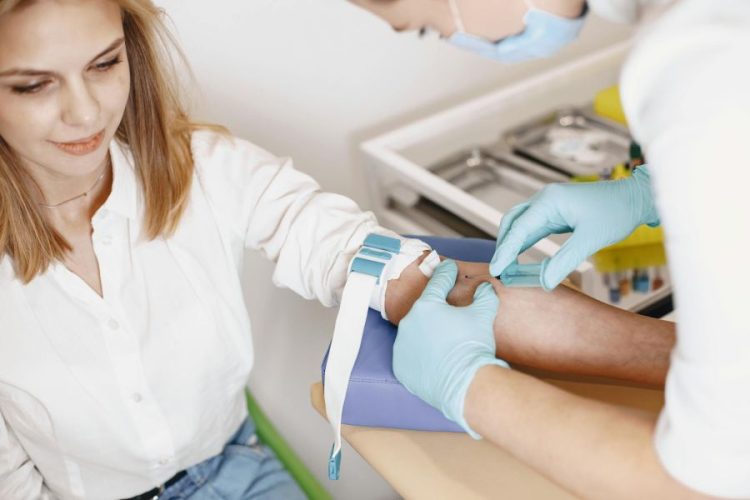From diagnosis to care: Your guide to finding a hematologist with expertise in ITP

Categories :
If you or someone you love is living with Immune Thrombocytopenic Purpura (ITP), it can feel like walking on eggshells.
ITP is a disorder where the immune system attacks and destroys platelets. These are the cells in your blood that help with clotting. Because the body doesn’t have enough platelets, people with ITP tend to bruise easily and have trouble getting their bleeding to stop.
Living with unexplained bruises, sudden nosebleeds, and constant worry about when the next bleeding episode might strike is the reality of ITP. But here's the thing: with the right care, ITP doesn't have to control your life. The key is finding a specialist who understands ITP inside and out.
A hematologist is a doctor who specializes in diagnosing, treating, and managing blood disorders, including conditions like ITP. They have extensive training in the science of blood, blood-forming organs, and blood diseases. They understand the complex interactions within the blood, including how blood cells like platelets function and what happens when these processes don’t work correctly.
Finding a hematologist with experience with ITP can help you or your loved one feel more confident about managing the condition. But in a huge metropolis like New York – where there are hundreds if not thousands of skilled hematologists – how do you go about finding one with expertise in ITP specifically?
MediFind is your shortcut to finding ITP specialists
Finding leading immune thrombocytopenic purpura specialists near New York, NY, can feel overwhelming, but MediFind makes it easier.
Using advanced algorithms, MediFind combs through vast amounts of medical data to highlight the best healthcare providers in your area for any given health condition. In other words, MediFind can show you which doctors have the most experience treating ITP near you. This not only saves you time, but also takes the guesswork out of finding the right expert.
MediFind allows you to compare doctors based on their experience, research involvement, and treatment success. This information can help you make an informed decision about your care and ensure you’re being treated by top-tier experts.
Whether you’re looking for a new specialist or seeking a second opinion, MediFind can simplify the process of finding the best hematologist for your needs.
What to expect at your first hematologist visit for ITP
After you’ve scheduled your first hematologist appointment, here’s what you can expect during your initial consultation:
- Medical History: The doctor will ask about your symptoms, medical history, and any medications you’re taking. They will want to know about any bleeding, bruising, or other signs you’ve noticed.
- Physical Exam: The hematologist may do a physical exam to look for signs of bleeding or bruising. They might also check your spleen, as it can become enlarged in some people with ITP.
- Tests: To confirm the diagnosis of ITP, the doctor will likely order blood tests to check your platelet levels and rule out other conditions. Sometimes, a bone marrow test may be needed to make sure the bone marrow is producing enough platelets.
- Treatment Plan: Based on your test results, the hematologist will discuss a treatment plan. This may include medications to increase platelet count, lifestyle changes to reduce bleeding risks, and in some cases, more advanced treatments like a splenectomy (removal of the spleen). The doctor will explain your options and work with you to decide what’s best for your situation.
Pro tip: Come to the appointment with a list of questions
It’s important to know as much as you can about ITP and how to manage it. Asking your hematologist questions is a great way to understand your condition and feel more in control. Your hematologist is there to support you, so don’t be afraid to ask anything on your mind.
Here are some sample questions to consider:
- What is causing my ITP, and how severe is it?
- What treatment options are available, and what are the potential side effects?
- How will we monitor my platelet levels, and how often do I need check-ups?
- Are there lifestyle changes I should make to reduce my bleeding risk?
- What should I do if I experience heavy bleeding or other symptoms?
How ongoing care helps you stay on top of your health
Living with ITP means your platelet levels can change over time. This is why regular check-ups with your hematologist are so important. By keeping a close watch on your condition, your doctor can adjust your treatment plan as needed. This might include changing your medication, adding new treatments, or simply giving advice on how to stay safe.
Sometimes you might want a second opinion, or you feel like your current specialist isn’t the right fit. If this happens, you can trust MediFind to quickly find another experienced hematologist who specializes in ITP, ensuring you always have the best ongoing care possible.
Citiesabc was created by a team of global industry leaders, academics and experts to create new solutions, resources, rankings and connections for the world’s top cities and populations.










